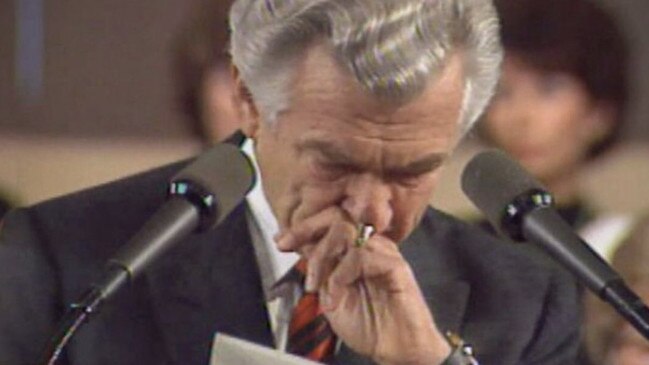Bob Hawke’s outrage at Tiananmen massacre
Bob Hawke’s government savaged China’s leadership for its brutal suppression of Tiananmen Square pro-democracy demonstrations and asked that Australians abroad be guaranteed their safety, according to newly declassified records.

Bob Hawke’s government savaged China’s leadership for its brutal suppression of Tiananmen Square pro-democracy demonstrations and asked that Australians abroad be guaranteed their safety, according to newly declassified records.
Cables sent between Beijing and Canberra in mid-1989 describe the crackdown, diplomatic response and contingency planning in the event that protesters penetrated the embassy compound and sought asylum if the Chinese government moved to quell dissent.
A statement read by foreign minister Gareth Evans to ambassador Nie Gongcheng reveals the top China diplomat in Canberra was told the ruthless use of force was both appalling and distressing, and China’s international reputation had been badly damaged.
“We profoundly deplore what can only be described as the brutally excessive use of force against peaceful demonstrators which has resulted in a massive death and injury toll,” Mr Evans told the ambassador on June 5. “(T)he violent suppression of what has been manifestly a peaceful demonstration involves issues of fundamental human rights, and Australia deplores human rights violations of this kind.”
Hawke urged embassy officials in Beijing to convey the same message to Chinese ministers. He emphasised that Australia welcomed the policies of “reform and openness”, which had been beneficial to China and the world.
Cables document the shock and dismay about the suppression of student-led pro-democracy protests in multiple cities – including in and around Beijing’s Tiananmen Square – the lack of reliable information and the uncertain “political situation”.
Amid reports that hundreds, and perhaps thousands, of demonstrators had been hurt or killed, Mr Evans sought the assurance of the Chinese government that the safety of Australian diplomats, residents and students would be “guaranteed”.
Cables and departmental memos also considered in advance the implications of protesters breaching the Australian embassy compound in Beijing to seek political asylum, temporary protection or status as a refugee or defector.
“Against the contingency that there is at some time a severe crackdown on students and others prominent in the demonstrations of the last 40 days, it is possible that some of them might seek asylum or sanctuary in Western embassies,” judged a cable on May 25.
The Australian ambassador, David Sadleir, said “any potential asylees” would be treated “with due care and consideration” as their “rights and status” were examined. The Hawke government also granted 42,000 permanent residency visas to Chinese nationals living in Australia.
Hawke cancelled a planned visit to China in October 1989, and other delegations and goodwill visits were suspended. Australians were advised to postpone travel to China. At a memorial service for the victims on June 9, Hawke wept as he read from a cable – already declassified – that reported “atrocities” had been committed on a “massive scale”.
In the final interview before his death in May 2019, Hawke recalled being shocked, sickened and saddened by reports from Beijing. “It broke my heart for China,” he said.
Troy Bramston is the author of Bob Hawke: Demons and Destiny (Penguin)




To join the conversation, please log in. Don't have an account? Register
Join the conversation, you are commenting as Logout